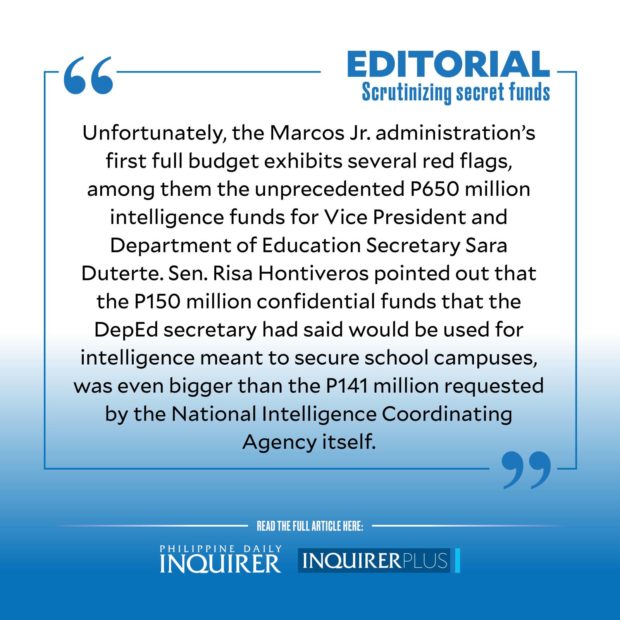
Without itemizing or identifying the programs covered by the lump sum, Pimentel said the DPWH would have “blanket authority” to disburse the P544 billion which, according to the senator, accounts for 75 percent of the agency’s P718.4 billion budget for next year.
“In the spirit of transparency, I call on the DPWH to provide the details of this huge allocation, down to the last centavo, so the Senate and the public will be able to scrutinize it,” Pimentel said.
Similarly, Albay Rep. Edcel Lagman last week flagged the P9.29 billion in confidential funds of various departments under the P5.26 trillion 2023 national budget.
“The more enormous the funds are, the greater … the possibility of graft,” Lagman said, as he urged Congress to “exercise judiciousness and frugality in the allocation of confidential and intelligence funds.”
As Pimentel pointed out, the allocation of lump sums has been an “old practice” that abets the use of public funds on the wrong priorities. Worse, the money could end up in the pockets of corrupt officials and contractors through substandard projects paid for by congressional pork barrel funds.
Following the Inquirer’s exposé of the P10-billion pork barrel funds diverted to ghost projects and fictitious nongovernment organizations by businesswoman Janet Napoles in July 2013, the Supreme Court declared unconstitutional the Priority Development Assistance Fund (PDAF), and its predecessor, the Countrywide Development Fund, the official terms for pork barrel funds allocated to the pet projects of members of Congress.
But Congress has since found other creative ways to circumvent the landmark court ruling in the annual budget, particularly through the DPWH, a favorite agency among lawmakers looking to score infrastructure and similar projects for their districts.
Aside from lump sum allocations, confidential and intelligence funds (CIF) are red flags in the annual government budget because of their very nature. According to Lagman, confidential funds “breed corruption” since their audit by the Commission on Audit (COA) cannot be disclosed to Congress and the public.
Unfortunately, the Marcos Jr. administration’s first full budget exhibits several red flags, among them the unprecedented P650 million intelligence funds for Vice President and Department of Education (DepEd) Secretary Sara Duterte. Sen. Risa Hontiveros pointed out that the P150 million confidential funds that the DepEd secretary had said would be used for intelligence meant to secure school campuses, was even bigger than the P141 million requested by the National Intelligence Coordinating Agency itself.
Nearly half of the P9.03 billion budget of the Office of the President is classified as confidential and intelligence funds as well, Lagman noted.
The Department of Budget and Management (DBM) also presented a P149-billion lump sum budget for the Support for Infrastructure Projects and Social Programs, whose acronym SipSP or “sipsip” has raised eyebrows among senators for its unabashed attempt to suck up to the new administration. The bigger issue however remains: what exactly are the projects included here?
As expected, the House—dominated by administration allies—hastily approved the 2023 national budget. It is now up to the more independent and critical members of the Senate to exercise due diligence and pay closer scrutiny to public expenditures to minimize the opportunities for graft and maximize the prudent allocation and use of taxpayer money.
The COA should conscientiously exercise its constitutional mandate and maintain its independence to promote transparency, and ensure accountability on the use of public funds and resources.
During the administration of President Benigno Aquino III, the COA and several agencies signed Joint Circular No. 2015-01, titled “Guidelines on the Entitlement, Release, Use, Reporting, and Audit of Confidential and/or Intelligence Funds,” to ensure a “more accountable and transparent use” of these funds in pursuit of the President’s agenda of good governance.
Aside from COA, the signatories to the circular were the DBM, the Department of the Interior and Local Government, the Department of National Defense, and the Governance Commission for government-owned and -controlled corporations. Then Budget Secretary Florencio Abad said the circular was signed “at a time when our people are demanding greater public accountability in the use of funds [to] ensure that activities funded by the CIF are legitimate ones.”
The COA should continue to use this circular as a strong legal instrument to counter moves by some agencies to get their hands on billions of pesos in secret funds.